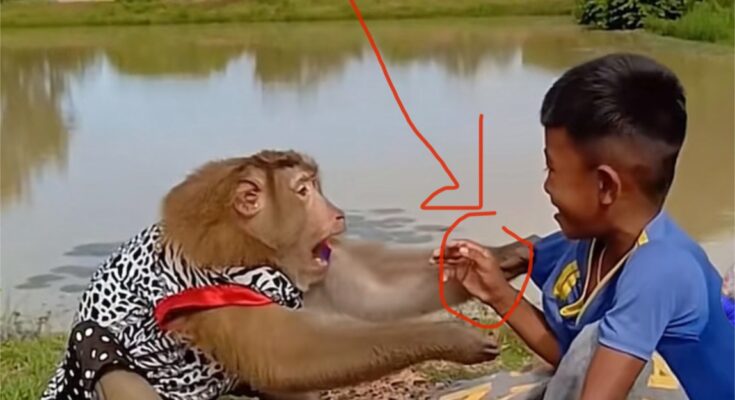In a shocking and deeply concerning incident, a young child has contracted rabies after being bitten by a large monkey, prompting urgent calls from health officials for increased public awareness and preventive measures against animal bites.
The incident occurred earlier this month when the child, reportedly around seven years old, was playing near a wooded area close to her home. According to witnesses, a large monkey approached the area, possibly searching for food, and became aggressive when confronted. Despite attempts by nearby adults to intervene, the animal bit the child on her arm before fleeing back into the trees.
The child was immediately rushed to a local clinic, where she received initial wound care. However, according to hospital sources, there was a delay in administering the full course of rabies post-exposure prophylaxis — a series of vaccines that can prevent the virus from spreading if given promptly. Days later, the child began showing symptoms consistent with rabies, including fever, agitation, and difficulty swallowing. She was subsequently transferred to a regional medical center for advanced treatment.
Health officials have confirmed that laboratory tests later verified the presence of the rabies virus, making this one of the few but extremely serious cases reported in recent years involving a monkey. Experts note that while dogs remain the most common carriers of rabies globally, monkeys can also transmit the virus through bites and scratches, particularly in areas where vaccination and wildlife control programs are limited.
Dr. Lina Mendoza, an infectious disease specialist, explained, “Rabies is nearly 100% fatal once symptoms appear, but it’s entirely preventable through timely vaccination. Any person bitten by a potentially rabid animal should seek medical care immediately. Even a small scratch can pose a serious risk.”
Following the incident, local authorities have launched an investigation to locate the animal and assess whether other monkeys in the area might also be infected. Wildlife officers are advising residents to avoid feeding or approaching wild animals, as such behavior can encourage aggression and increase the risk of attacks.
Meanwhile, community health teams have begun conducting awareness campaigns in nearby schools and neighborhoods, emphasizing the importance of early treatment after any animal bite. Parents are being reminded to ensure that their pets are vaccinated and to teach children not to play near wild or stray animals.
This tragic case serves as a sobering reminder that rabies remains a significant public health concern in many regions. The World Health Organization estimates that tens of thousands of people die from the disease every year, most of them children in rural areas. Experts stress that education, animal vaccination, and rapid medical response are key to preventing future tragedies.
As the affected family continues to receive medical and emotional support, officials hope that this case will spark greater vigilance among communities. Prompt action and awareness can mean the difference between life and death when dealing with rabies — a disease that should no longer claim innocent lives in the modern world.



